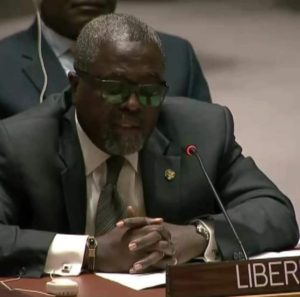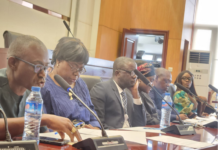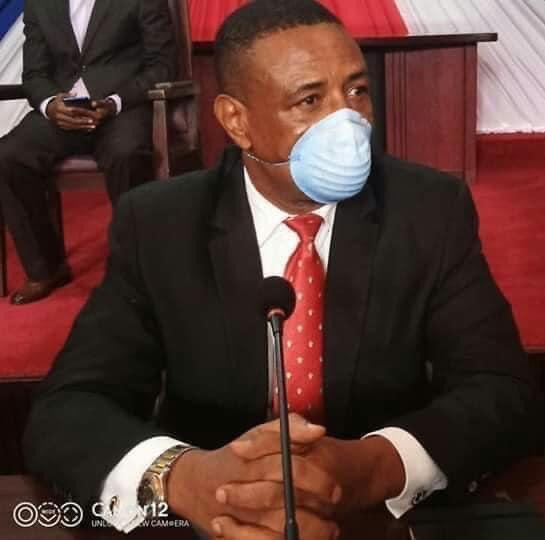By Amb. Lewis G. Brown|Former Liberia Amb. to the United Nations
At a time when attention is focused on fighting the Coronavirus Pandemic, Mr. A. Ndubuisi Nwabudike is seeking a Declaratory Judgment “to declare his right to Liberian Citizenship”.
The request beguiles an intent to circumvent personal responsibility in inviting the courts to do for Mr. Nwabudike what he has obviously and publicly failed to do for himself, and seeks to gratuitously impugn the integrity of the court.
I am not an officer of the court. The truth also is that the judge does not have to listen to me, or entreat my opinion with any serious consideration. However, I am too proud a citizen of Liberia to will myself into silence as the collective intelligence of our nation is being undeservedly intruded upon and challenged.
While it resides within the purview of the courts to determine, I believe Mr. Nwabudike’s request presents the nation with a deeper consideration of the shared values of our Liberian citizenship, and the extent to which we are called upon to always cherish, honor and protect it.
The primary basis for Mr. Nwabudike’s request to the court is speculation “by some group of persons hiding under the banner of the LNBA to challenge his status as a Liberian citizen”. This speculation is anything but frivolous.
While from the perspective of the Liberia National Bar Association, it may only concern Mr. Nwabudike’s license to practice law, everywhere else in the world, as it also is in Liberia, without prejudice to Mr. Nwabudike, to lie to immigration authorities, falsify citizenship records and documents, and or misrepresent ones citizenship, including to the highest court, so as to benefit from a country’s schooling system, or the practice of law, as speculated, if proved, are grounds for arrest and deportation.
Despite this, the LNBA is not made a party to his petition so as to afford it a right to respond. Mr. Nwabudike elects to enjoin the relevant authorities of the Ministry of Justice with which he recently “associated … and successfully prosecuted a case of “Economic Sabotage” involving the former Defense Minister and others.” The Ministry of Justice can be expected to do the right thing, but commonsense commands us to wonder whether or not the Ministry which has not accused him, and with which he openly associates, can be reasonably expected to seriously question his Liberian citizenship, without correspondingly drawing their work, association, credibility and judgment into question. As Shakespeare would swear, there has got to be method to this madness!
Throughout his submission, Mr. Nwabudike dazzles with various provisions of the Constitution of our country. At first glance, it impresses a useful knowledge of the Liberian Constitution. Upon deeper reading however, it is easy to discover that rather than support his request, the constitutional citations actually undermine it, and screams at the obvious lack of understanding of the letter, spirit and intent of the Constitution. For example, Article 27(a) which is cited in Count #6 says: “All persons who, on the coming into force of this constitution were lawfully citizens of Liberia shall continue to be Liberian citizens” (emphasis mine).
Article 27(a) does not nilly-willy confer citizenship upon anyone merely upon the coming into force of the 1986 Constitution, without the right to ever be questioned as to its lawful acquisition. This is especially true now that his lawful acquisition of Liberian citizenship is the issue of contest, for which, on account of his withdrawal, public utterances, the available records, or lack thereof, there are more than sufficient reasons to question the lawfulness of his acquisition of Liberian citizenship.
Mr. Nwabudike knows, or ought to know, that the burden to purge himself of the risks to his unlawful acquisition of Liberian citizenship, at any time over the life of Article 27(a) of the Liberian Constitution, is not on the Louis Arthur Grimes School of Law which he attended, nor is it to be transferred to the Honorable Supreme Court of the Republic of Liberia before whose bar he has practiced law.
This burden is forever placed upon his head. That he may have misled the respected law school and the Honorable Court with fake and or falsified documents, as it is being speculated, and given that he has offered very little publicly to dissuade otherwise, cannot amount to a favorable and convincing evidence of his lawful acquisition of Liberian citizenship. It is merely an attempt to shift the burden of proof of his legal acquisition, and in that regard, is disingenuous, deceptive, irresponsible, and defies the clarity in the letter, spirit and intent of Article 27(a).
It is easy to see that the operative word of Article 27(a), which unambiguously expresses the intention of the framers, is the word lawfully. There can be no plainer meaning therefore that prior to the coming into force of the 1986 Constitution, all who acquired Liberian citizenship had a burden placed upon them to do so lawfully, at the risk to themselves that the unlawful acquisition of Liberian citizenship, if proved to be so, can and must be, dutifully denied.
Clearly, the framers of the Constitution could never have instructed that any of its subjects derive any legal advantage and benefits from unlawfulness. As lawyers would point out, “quod contra legem fit, pro infecto habetur” – what is done contrary to the law, is considered as not done at all.
A second example of the misrepresentation of the Liberian Constitution is found in his reliance on Article 95(a), in which he asserts that “for anyone to question the acts of the PRC Government during its existence runs counter to provisions of the Organic law.” Again, this is an errant and deceptive interpretation of Article 95(a) whose relevant condition for reliance as well as the intent of the framer is found in the conditional phrase: “…in so far as it is not inconsistent with any provision of this Constitution” (emphasis mine). Article 28, which unambiguously commands the singularity of Liberian citizenship at maturity, which essentially denotes personal choice and adult consent, by the renunciation of other citizenship acquired through parentage.
Accordingly, not only is the lawful acquisition of Liberian citizenship at issue on account of Mr. Nwabudike’s own public failings at Confirmation Hearings before the Liberian Senate, he has also invited reasonable questions about his renunciation of his Nigerian citizenship which he acquired by birth, and cannot be legally denied him, unless and until he renounces same in accordance with Nigerian law. To attempt to shield himself under Article 95(a), so as to be permitted to violate Article 28, runs counter to the letter, intent and spirit of the Constitution, and alls the honesty of his claims into question.
Mr. Nwabudike argues further that to “require an applicant for Naturalization to denounce and obtain a certificates (sic) of renunciation from his/her country before coming to Liberia to apply for naturalization raises the question of “upon what travel documents would the prospective candidate for naturalization travel to Liberia?” Mr. Nwabudike is right – the anticipation of the law cannot be that an applicant for citizenship must become stateless as a condition to lawfully acquire naturalization.
However, Mr. Nwabudike is wrong to impress that he needs to travel to Nigeria to renounce his Nigerian citizenship, or that by taking on Liberian citizenship, a renunciation of his Nigerian citizenship effectively obtained. As a citizen by birth of the Federal Republic of Nigeria, Mr. Nwabudike is entitled, by the Constitution of Nigeria, to take on the citizenship of another country without that naturalization amounting to a loss of his Nigerian citizenship. This is according to Chapter III, Articles 28 and 29 of the 1999 Constitution of the Federal Republic of Nigeria.
A formal process of renunciation is required before citizens by birth can lose their Nigerian citizenship. This process does not require a travel outside ones naturalized country if an Embassy of Nigeria is located near the country’s capital.
The Nigerian law simply requires the submission of relevant documents testifying to proof of Nigerian citizenship as well as a completed application for renunciation form, whose signing must be duly notarized. These documents can be submitted to the Nigerian Embassy in Monrovia, and would bear the same weight as if they were hand-delivered in Abuja, the Headquarter of the Federal Republic of Nigeria.
Of course, Mr. Nwabudike knows this! After all, this, too, falls in the common knowledge of why embassies exist and enjoy internationally-acceptable sovereign statuses and designations.
I cannot understand why Mr. Nwabudie would elect to misrepresent this common fact. Notwithstanding, ours is a country enriched by our proud history of friendship and openness to all peoples of the world, especially brothers and sisters of negroid descent. We will remain a better and stronger nation by continuing to do so, knowing that Mr. Nwabudike’s attempts at deceptions and less than honorable representations do not, in any way, represent the gratefulness, honesty, love and respect of many who are proud to take on Liberia’s citizenship, or are simply content to live with and among us. The truth also is that while this is entirely on Mr. Nwabudike, it challenges our commitment to upholding the rule of law in the country.
I therefore urge a denial of Mr. Nwabudike’s request knowing that such denial can never weigh against our proud history and legacy as a trailblazing nation, and a beacon of light for all who seek freedom and justice. For people everywhere who hunger for freedom and opportunity, Liberia’s light must continue to shine and inspire. This, too, is Liberia’s destiny. In shining that light, however, we must never slumber in our country’s defense, or compromise in the face of its abuse.
Let there be no mistake: Liberia owes a reciprocal duty to the world to share its citizenship, and by doing so, to avail without hindrances, all of the enjoyments of rights and privileges it confers. And so, at the heart of Mr. Nwabudike’s request is not only his “right to Liberian citizenship” but also the right of all Liberians to value and honor our citizenship, however imperfect our circumstances may be, and to always ensure it is acquired lawfully.
If Liberians do not value who we are, who will?
About the author:

Ambassador Lewis G. Browne is former Liberian Ambassador to United Nations and also served as information minister during the administration of former Liberian president Ellen Johnson Sirleaf. He is a member of the former ruling party of Liberia, the National Patriotic Party of ex-president Charles Taylor
























